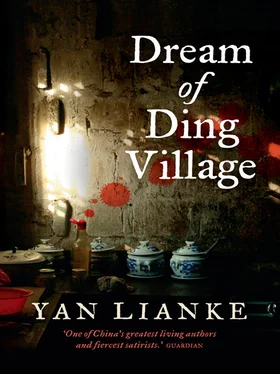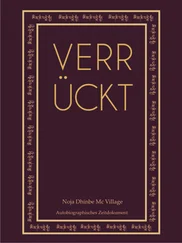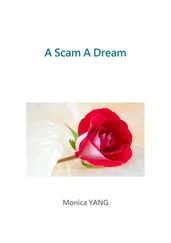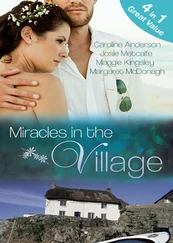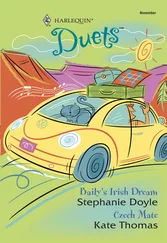‘Tell everyone to come to the school, and I’ll put on a concert for the whole village. You know how well I sing, and people need an excuse to get out of their houses,’ said Ma Xianglin.
‘The school is the perfect place for a concert.’ Ma Xianglin took a few steps forward.
‘If you ask, everyone will listen. Just like they did when you asked them to sell their blood. And it was your son Ding Hui they sold it to, even though everyone knew he used the same needles and cotton swabs again and again. Not to bring up the past. . but every time I sold my blood, I went to your son, reused needles or not. I sold him everything I had, and now when I run into him on the street, he can’t even be bothered to say hello. Of course, that’s all in the past, no point bringing it up now. All I ask is that you tell everyone to come to the school so I can sing them a few songs. I don’t mean to harp on the past, Professor, really I don’t. Just let me sing a few folk songs so I won’t feel so depressed. Otherwise, I’m afraid I won’t live long enough to see those new medicines.’
Ma Xianglin, now standing a few paces away, stared into Grandpa’s eyes. A beggar hoping for food. Over Ma Xianglin’s shoulder, Grandpa saw several other villagers gazing at him expectantly. There was Li Sanren, the former village mayor; Zhao Xiuqin, a local loudmouth known for her delicious cooking; and Zhao Dequan, a simple, honest farmer. Grandpa knew them well, and knew that they all had the fever. He knew exactly what they had come to ask.
‘The new medicine will be here any day now,’ he announced loudly. ‘Xianglin, when do you want to give your concert?’
The old musician beamed. ‘Tonight. Or if that’s too soon, tomorrow night. Tell the villagers I’ll sing anything they like, for as long as they want to listen.’
3
After parting from Ma Xianglin with promises, Grandpa continued walking towards our house. My family lived on New Street, south of the village. Built during the blood boom, New Street was the newest street in the village. If you got rich from buying or selling blood, you moved your family from the village centre to New Street and built a brand new two-storey house, which was as high as local building regulations allowed. Each lot was about one mu , one-sixth of an acre, with a house at one end and brick walls enclosing the other three sides. Every house was covered in white ceramic tiles, and the walls were built from machine-made red brick. Red and white: the colours of joy and sorrow. All year round, the neighbourhood gave off the smell of newness and wealth. There was also a tinge of gold and a whiff of sulphur. The whole street smelled of sulphur, brick and mortar.
In the midst of all this stood our house. Night and day, the stench of sulphur filled our nostrils, stung our eyes and provoked people to envy. Everyone wanted a house on New Street, and those who couldn’t afford one were willing to sell their blood to get it.
That’s how they got the fever.
In all, about two-dozen families lived on New Street. At the head of every household was a blood merchant, or ‘bloodhead’. The bloodheads made more money than anybody else and that’s why they could afford to live on New Street. They moved south of the village, and built new houses. It was the bloodheads who made New Street what it was.
My father was the first blood merchant in the village and he soon became the richest. That is the reason why our house, which was built at the very centre of New Street, was three-storeys high, even though the local building regulations limited each house to only two. If anyone else had tried to do the same, the government would have put a stop to it. But when my father added a third storey, no one seemed to mind.
We didn’t set out to build a three-storey home, not at first. When everyone else was living in thatched, mud-brick cottages, my father built a single-storey house of brick and tiles. When everyone else started building brick-and-tile houses, my father tore down ours and built a new two-storey in its place. When everyone else started building two-storey houses, my father added a third storey. When other people tried to add a third storey or build a three-storey home from the ground up, the government stepped in, saying that regulations limited model villages to buildings of no more than two storys.
But our house had three storeys: one more than anyone else.
Like most people in the village, we had a pig pen and a chicken coop in our courtyard. But they seemed out of place, they didn’t match the architecture of our house. Even the pigeon cages beneath the eaves seemed out of place. In designing our house, my father had tried to copy the fancy western-style homes that he’d seen in the big city of Kaifeng. He ordered pink-and-white marble tiles for the floors and paved the courtyard with square slabs of concrete. Instead of a tried and true outdoor squat toilet of the sort that Chinese people had been using successfully for hundreds, even thousands of years, we had an indoor toilet made of white porcelain. But my parents, unable to adapt to shitting while sitting down, ended up building a squat latrine behind the house, anyway.
We also had a washing machine and a laundry room, but my mother preferred to take her basin out into the courtyard to do the washing there.
The toilet and the washing machine were just for show. Ditto for the freezer and the refrigerator, the dining room and dining table. We had these things in our house, but only to show that we could afford them. None of us actually used them.
When Grandpa arrived at our house that evening, he found the front gate locked and the whole family out in the courtyard having their dinner of steamed buns, rice soup and a stew of glass noodles, turnip and cabbage. Confetti-sized bits of red pepper clung to the cabbage, making it look like someone had shredded a Chinese New Year’s calendar into the stew. Seated on low stools around a small table in the centre of the courtyard, my parents and sister were in the middle of eating their dinner when they heard a knock at the gate and saw that it was Grandpa.
My little sister let him in and closed the gate. My mother pulled up another stool and ladled out an extra bowl of soup. Grandpa picked up his chopsticks, but instead of eating, he stared at my father as if he were a stranger. There was no warmth in Grandpa’s eyes.
My father gazed back at Grandpa just as coldly. Two complete strangers.
‘Dad, why aren’t you eating?’ he asked, finally.
‘Son, there’s something weighing on my mind and I’ve got to say it.’
‘Can’t it wait until we’ve eaten?’
‘No, I won’t be able to eat a bite or sleep a wink until I say this.’
My father set down his bowl, laid his chopsticks across the rim and cast a sideways glance at Grandpa. ‘All right, go ahead.’
‘I had a meeting in the county today. .’ Grandpa began.
‘And they told you that the fever is AIDS, and that AIDS is a new and incurable disease, right?’ my father interrupted.
‘You might as well eat your dinner, Dad, because you’re not telling me anything I don’t already know. Two out of three people in the village know it. It’s just the sick ones who don’t, and most of them are just pretending not to know.’ He looked at Grandpa with disdain. It was the sort of glance a student might give a teacher setting an exam on some subject his students had long since mastered. Then, ignoring Grandpa, he took up his bowl and chopsticks and buried himself in his meal.
Grandpa was a teacher, sort of. He had spent his whole life working in the school and ringing the school bell. Now, in his sixtieth year, he was still the designated caretaker and bell-ringer. Sometimes, when one of the teachers got sick or couldn’t teach for some reason, he was called in to take their place. On these occasions, he might spend half a day teaching the opening stanzas of the Three-Character Classic , which he would write out in painstaking, platter-sized characters on the blackboard.
Читать дальше
